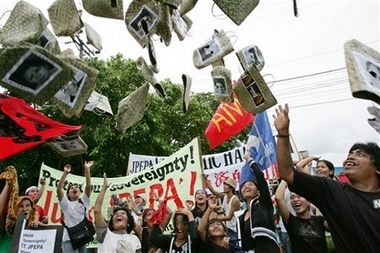Santiago sees ‘dead’ JPEPA if gov’t won’t explain benefits
Inquirer | 09/20/2007
Santiago sees ‘dead’ JPEPA if gov’t won’t explain benefits
By Veronica Uy
INQUIRER.net

MANILA, Philippines — Round 2 went to oppositors of the Japan-Philippines Economic Partnership Agreement (JPEPA) Thursday as government negotiators failed anew to answer basic questions from senators on the benefits of the treaty to the country.
Senator Miriam Defensor-Santiago, chairman of the committee on foreign relations, has threatened to sit on the JPEPA and not sponsor it on the floor, which would effectively make for a diplomatic rejection of the treaty.
During the hearing, Santiago told government negotiators, headed by Trade Undersecretaries Thomas Aquino and Elmer Hernandez: “If I find it impossible to defend it on the Senate on the basis of your statement, then as chair, I will be compelled to defer submission of my committee reports. In other words, JPEPA will be dead.”
This after Senator Manuel Roxas II failed to get answers to the following questions:
– What is government doing to help people take advantage of the JPEPA? “I want to know were, what, and what sectors...will be able to take this stepladder...to the window opened by the JPEPA?”
– What are the benefits of the JPEPA? “[What the government presented] are pie in the sky numbers based on leads, inquiries, and letters. I want the records of the BOI [Board of Investments] and DTI [Department of Trade and Industry] of what actually came in. A lot of the decisions depend on the validity of your claims of benefits,” Roxas said.
– How much did the Philippines give up to get these benefits?
“In the last hearing, I was left disappointed because it has been made clear why it is good for us...We are finished with the period of generalities. We want to move...to specifics,” Roxas said.
The government claims that the treaty will result from 2007 to 2010 in P7.7 billion in total revenues, P364.9 billion in foreign direct investments, and 221,000 additional jobs.
Roxas asked the government panel why the Philippines did not contest the exclusion of some 600 products in the exemption list to tariff reduction or elimination.
When told that most of those that were given away were not important to the Philippines, Roxas lost his cool and rejected the explanation.
“In any negotiation, there is a give and take and we expect that for every give, there’s a get,” he said.
Roxas heads the committee on trade and commerce, which co-chairs the JPEPA hearings with the committee on foreign relations.

“If this were a boxing match, round 2 again went to the oppositors of the treaty...It gets worser and worser as Alice said in Alice in Wonderland...I refuse to crucify myself and defend it on the Senate floor. I will go up in flames,” Santiago told reporters after the hearing.
Describing government’s non-response in the hearing as “surreal,” Santiago said the government panel only presented theoretical benefits of the treaty “far removed from the world of economic realities.”
She said that for the second time, the oppositors presented a clearer picture of why they wanted the treaty rejected.
One of them, lawyer Mimi Sison of the Green Initiatives Inc., pointed out the constitutional violations that would be committed with the treaty’s ratification.
“Why is it better for the Philippines? We don’t want to know Japan’s gains and losses. We want to know the benefits to the country in exchange for all the concessions we are making,” Sison said.
Thus, Santiago said she would add another discussion on the constitutionality of the treaty, where among those invited would be Professor Merlin Magallona. She also announced that the hearing on the environmental aspects of the JPEPA would be moved to next week as other senators would be leaving for abroad.
During the same hearing, Lawyer Golda Benjamin of the Junk JPEPA Coalition told the Senate that the country’s negotiators “wrongly and criminally” use a Japanese macroeconomic study to defend the treaty.
Benjamin said the paper, called the Kawasaki document prepared by Japan ’s Research Institute on Economy, Trade, and Industry, was “made by the Japanese for the Japanese.”
She asked why the government negotiators were using Japanese estimates when they did not present Philippine interest.
Santiago ordered the government negotiators to respond to the accusations in the next hearing.
The Senate, which is conducting weekly hearings on the bilateral treaty, has the power to ratify or reject the agreement.





